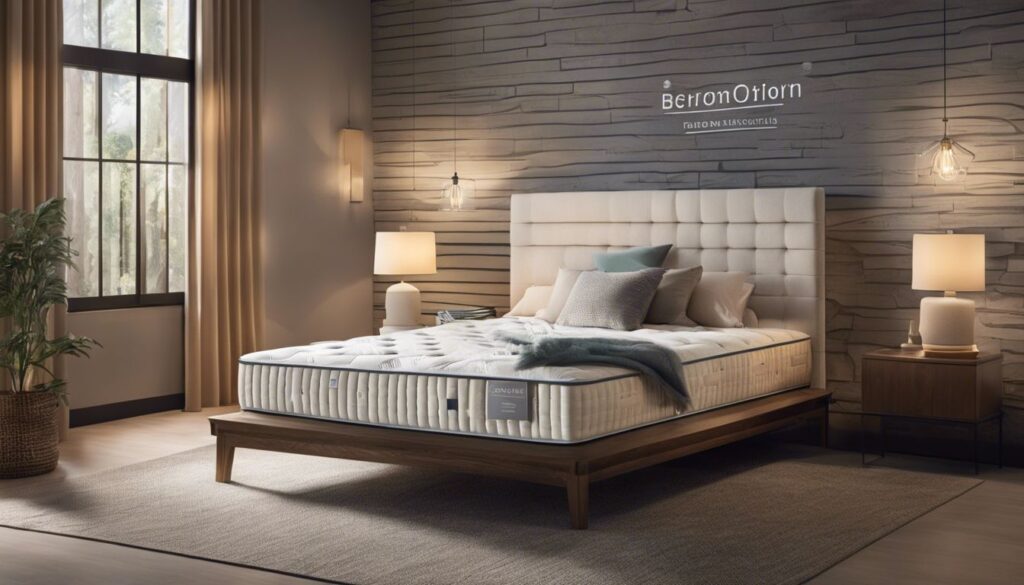Finding the right mattress can be a challenge for seniors with arthritis. WinkBed, Helix Midnight, and Saatva are top choices that offer relief. Our guide will detail criteria to select the best option for comfort and support.
Discover your ideal mattress here.
📋✅
- Seniors with arthritis need mattresses that offer good support and comfort. This helps keep their spine straight and eases pressure on joints.
- Medium-firm mattresses often work best for them. Memory foam or latex materials are great because they shape to the body, reducing stress on sore spots.
- Features like temperature control, motion isolation, and edge support improve sleep quality by keeping the bed cool, quiet, and easy to get into.
- Hybrid beds mix different materials for both firmness and softness. They could be a smart pick for those looking for balanced support.
- Trying out mattresses is important. Look for ones with trial periods so seniors can make sure the bed feels right for their needs over time.
Understanding Arthritis and Its Impact on Sleep

Arthritis makes joints swell and hurt, making it hard to rest well. This pain can change how someone sleeps, often leading to trouble staying asleep.
Importance of Support and Comfort
Support and comfort in mattresses are crucial for seniors with arthritis. A mattress that provides balanced support helps reduce joint pain. Nicole Hernandez, DPT, points out that such mattresses can greatly ease discomfort.
For back pain relief, medium-firm mattresses are often the best choice. They help keep the spine aligned while sleeping. This reduces stress on sensitive areas.
Choosing the right firmness is key to finding a mattress that supports without causing more pain. Memory foam, known for its pressure relief capabilities, contours to the body’s shape.
This lessens pressure on sore joints and muscles throughout the night.
A good night’s sleep starts with a mattress that offers both support and comfort.
How Arthritis Affects Sleep Patterns
Arthritis causes pain and stiffness in joints, making it hard for people to find a comfortable sleeping position. About 70% of those with osteoarthritis experience sleep troubles, as reported by the Arthritis Foundation.
This discomfort often leads to difficulty falling asleep and staying asleep, resulting in fragmented sleep. The lack of deep sleep can worsen arthritis symptoms, creating a cycle of pain and poor rest.
Choosing the right mattress becomes crucial for seniors with arthritis to break this cycle. Supportive mattresses that align with their specific needs can significantly improve sleep quality and reduce joint inflammation during the night.
Let’s look at what makes a mattress suitable for someone dealing with arthritis.
Key Criteria for Choosing a Mattress for Seniors with Arthritis
When picking a bed for older adults with joint pain, focus on how much it supports and its make-up. The right mattress eases pain by helping the spine stay straight and uses materials that comfort sore joints.
Support
The right mattress gives the spine and joints the support they need. For seniors with arthritis, a Saatva Classic mattress offers medium-firm support that helps relieve back pain. This type of support aligns the spine well.
It stops painful pressure points from forming during sleep. Mattresses like hybrid models and those with memory foam balance cushioning and firmness perfectly.
Good mattresses also have edge support and lumbar region reinforcement. These features ensure that getting in and out of bed is easy for those with mobility issues related to arthritis or other chronic conditions like fibromyalgia or obstructive sleep apnea (OSA).
They offer stable sleeping surfaces too, which are essential for uninterrupted rest.
Firmness Level
Choosing the right mattress firmness is key for seniors with arthritis. Medium-firm mattresses are often best as they provide a balance of cushion and support. This mix helps ease joint pain, making it easier to sleep.
Firmness affects how well a mattress can support the body and keep the spine in line. For people who sleep on their side, a softer mattress might feel better. Back sleepers usually need something medium to firm.
Stomach sleepers should look for firmer options to avoid back pain.
Materials like memory foam and latex add comfort and support, matching the body’s shape. These materials work well in mattresses of all firmness levels for arthritis relief. A good match keeps pressure off painful joints and helps with better sleep throughout the night.
Material Composition
Material types are key for seniors with arthritis choosing a mattress. Foam mattresses, like memory foam and latex, provide good support and pressure relief. Memory foam molds to the body, reducing pressure points that can stir up arthritis pain.
Latex is durable and offers a firmer feel than memory foam but still eases discomfort by supporting natural spine alignment. Hybrid mattresses mix coils with foam or latex layers for a balance of comfort and support that many find ideal.
Hybrid choices offer both cushioning against sore joints and enough firmness to keep the spine aligned. These often include gel-infused memory foam or pocketed coils for better temperature regulation and motion isolation.
The right material composition helps in easing symptoms of rheumatoid arthritis, lowers back pain, reduces sleep disturbances like snoring or restless leg syndrome, ensuring a more restful night’s sleep.
The best mattress supports the body’s curves, easing arthritis pain.
Types of Mattresses Suitable for Arthritis
For seniors with arthritis, finding the right type of bed is key. Hybrid beds, memory sponge beds, latex beds, and adjustable bases offer varied support and comfort to ease joint pain.
Hybrid Mattresses
Hybrid mattresses blend several materials like memory foam, latex, and innerspring coils to provide a mix of support, pressure relief, and durability. Helix Midnight Luxe stands out with its cushioned pillow top and lumbar support zones designed for spine alignment and comfort.
WinkBed also excels by offering robust support that can benefit seniors with arthritis. These beds are built to ease pain by evenly distributing body weight and reducing pressure on joints.
These mattresses have layers that work together to help sleepers find the perfect balance between firmness and softness. Memory foam offers contouring for the shoulders and hips, while the innerspring layer promotes air flow, keeping the bed cool throughout the night.
Latex adds bounce and resilience, making it easier for seniors to move around on the bed without feeling stuck. With options like Brooklyn Bedding Signature Hybrid available, caregivers can pick a mattress that adjusts well to changing needs over time, ensuring long-term comfort for those with arthritis.
Memory Foam Mattresses
Moving on from hybrid options, memory foam mattresses offer unique benefits for seniors with arthritis. These beds provide excellent cushioning and support, crucial for those suffering from joint pain.
Products like the Layla Memory Foam mattress stand out because they feature a dual-sided design. This allows users to choose between different firmness levels by simply flipping the mattress over.
With a price starting at $1,099 and offering a 120-night trial period, Layba offers flexibility and comfort in one package.
Another notable option is the Nectar mattress which falls into the medium-firm category, making it an optimal choice for maintaining spinal alignment and reducing pressure points during sleep.
The Nectar range’s prices vary from $699 to $1,798 depending on size and specifications but come with a reassuring 365-night trial and a lifetime warranty. Both of these products showcase how memory foam mattresses can be adjusted to meet the needs of individuals with arthritic changes by providing necessary body contouring as well as varying degrees of firmness to suit personal comfort preferences.
Latex Mattresses
Latex mattresses stand out because they last long and ease pressure well. The Birch Mattress is an excellent example, known for its organic materials and medium firmness. It works great for hot sleepers and people over 130 pounds, making it a solid choice for seniors with arthritis.
Latex mattresses provide durability and comfort, crucial for relieving arthritic pain.
These beds use eco-friendly materials that offer strong support while reducing the impact on painful joints. Their natural elasticity helps in adjusting to body movements during sleep, ensuring a restful night without aggravating arthritis symptoms.
Adjustable Beds
Moving on from latex models, adjustable beds offer unique benefits for seniors with arthritis. These beds let you change the bed shape to make sleeping easier and reduce pain. With options like the Bear Elite Hybrid, they use technology that can match personal comfort needs by adjusting firmness levels.
Some even come with massage features to help soothe aches in joints and muscles.
Adjustable beds also allow for positions that support better breathing and lessen back pain during sleep. For example, raising the head section slightly can aid those with sleep-related breathing disorders or Alzheimer’s who find it hard to get comfortable at night.
The flexibility of adjusting bed angles means relieving pressure off sensitive areas like hips and shoulders, crucial for side sleepers needing extra care.
Features to Consider in a Mattress for Arthritis Relief
Choosing the right mattress involves looking for features that ease arthritis pain. Think about how a bed can lessen pressure and keep your body cool at night.
Pressure Relief Capabilities
Saatva Classic and Helix Midnight both excel in pressure relief, making them ideal for seniors with arthritis. These mattresses ease stress on key areas like hips and shoulders during sleep.
Saatva uses coil springs combined with foam layers to distribute weight evenly. Helix includes memory foam that molds to the body, reducing points of tension.
Pressure relief is crucial for comfort and pain reduction in arthritis patients. The right mattress minimizes discomfort by supporting vulnerable joints throughout the night. This support helps maintain natural spine alignment, promoting restful sleep without added strain on painful spots.
Edge Support
Edge support makes a big difference for seniors with arthritis. Helix Midnight Luxe is one example that shows strong edge support, making it easier to get in and out of bed. It is best for stomach and combination sleepers.
Customers who bought Helix Midnight also say its edge support is good.
Good edge support means less worry about slipping off the side when sitting or sleeping near the edge.
Temperature Regulation
Keeping a senior with arthritis comfortable at night requires mattresses that manage temperature well. The Nectar Mattress, for example, has a cooling gel infusion in its top layer and uses a breathable poly-nylon blend cover to help air flow freely.
This design pulls heat away from the body, ensuring cooler sleep. Similarly, the Leesa Oasis Chill Hybrid mattress is known for its excellent ability to dissipate heat due to pressure relief capabilities.
Both these mattresses highlight the importance of materials that prevent overheating in bed. Memory foam often traps heat, but when infused with cooling gels or designed with open-cell technology, it significantly improves nighttime temperature regulation.
Good airflow around and through the mattress also plays a key role in keeping temperatures down. Next up we’ll discuss motion isolation features important for seniors sharing their bed.
Motion Isolation
Motion isolation is crucial for people who share a bed, especially if one person moves a lot at night. Mattresses like the Nectar excel in this feature. They ensure that movements on one side of the bed don’t disturb someone sleeping on the other side.
This quality is vital for seniors with arthritis who need to sleep without interruptions. Good motion isolation mattresses minimize disturbances, helping both partners get a better night’s rest.
Selecting a mattress with high-quality motion isolation can make a big difference for those facing difficulty sleeping due to pain or discomfort from arthritis. For instance, memory foam and hybrid mattresses are known for their ability to absorb movements.
This means less tossing and turning for both sleepers throughout the night. By choosing beds with these materials, you guarantee more peaceful sleep, reducing the chances of waking up from pain or partner movement.
Assessing the Ideal Mattress Firmness
Finding the right bed stiffness depends on how you sleep. Side sleepers might like it softer, back snoozers need it a bit harder, and belly sleepers benefit from a firm one. This choice can help make sure arthritis doesn’t disturb rest as much.
Soft to Medium for Side Sleepers
Side sleepers need mattresses that are soft to medium in firmness. This helps reduce pressure on shoulders and hips for a comfortable night’s sleep. Helix Midnight is one of the best options for side sleepers, offering the right support and comfort level.
The Leesa Oasis Chill Hybrid also provides good choices with its medium soft (4) and medium (5) firmness levels catering to personal comfort needs.
Choosing the right mattress affects how well you sleep, especially if you have hip pain or shoulder pain from arthritis. A mattress that is too hard can worsen these issues, while one that is too soft might not offer enough support.
Look at memory foams or hybrid mattresses which provide both comfort and support needed by side sleepers with arthritis.
Finding the perfect balance in mattress firmness can transform rest for seniors with arthritis.
Medium to Firm for Back Sleepers
Choosing a medium to firm mattress helps relieve back pain for those who sleep on their back. This firmness level supports the spine well. It keeps it in a straight line during sleep, which is important for comfort and health.
The WinkBed Mattress, known for its hybrid design and luxury firm feel, is often recommended. It combines solid support with cushioning that adapts to the body’s shape.
For seniors with arthritis, such mattresses can make a big difference. They ease pressure on sore backs and joints, making it easier to get in and out of bed. Features like individually wrapped coils offer zoned support customized to different parts of the body.
These elements work together to improve sleep quality and reduce discomfort caused by arthritis.
Firm for Stomach Sleepers
After considering the needs of back sleepers, it’s critical to focus on seniors who prefer stomach sleeping. A firm mattress is essential for them. It supports proper spine alignment and prevents deep sinking that can strain the neck and back.
The Helix Midnight Luxe stands out for its excellent edge support, making it ideal for stomach and combination sleepers who need a stable surface. Firm mattresses like this ensure the body stays level throughout the night, reducing discomfort in sensitive areas.
Stomach sleepers with arthritis require mattresses that maintain their natural spinal curve without compromising comfort. Firm options prevent undue pressure on joints and lower back pain by keeping the hips aligned with shoulders.
Such mattresses are not just about firmness; they embody precise engineering to cater to specific sleeping positions while offering relief from arthritis symptoms during rest.
The Role of Mattress Materials in Arthritis Care
Mattress materials play a big part in easing arthritis pain. Memory foam molds to the body, while latex offers a bouncy support, and hybrid beds give a mix of both comfort and backing.
Benefits of Memory Foam
Memory foam mattresses stand out for their unique ability to ease pressure points and mold to the body. This material has a special way of distributing weight evenly across the surface, making sure that sensitive areas like hips and shoulders don’t bear too much pressure during sleep.
A model such as the Helix Midnight highlights this advantage with its combination of memory foam, responsive polyfoam, and a support core of pocketed coils. This structure offers deep comfort and provides ample support where it’s needed most.
Another notable benefit is the capacity for motion isolation that memory foam brings to the bed. For those sharing a bed, movements from one side won’t disturb someone on the other side thanks to this feature.
It means less disruption for sleepers when their partner shifts position or gets in and out of bed. Temperature regulation is enhanced through innovative designs in models like Helix Midnight, incorporating materials that help maintain a comfortable sleep environment all night long.
Advantages of Latex
Latex mattresses stand out for their durability, making them a solid pick for seniors with arthritis. These beds can keep their shape and provide consistent support over many years.
Unlike other types, latex is naturally resistant to dust mites and mildew. This feature makes it an excellent choice for folks dealing with allergies.
Besides being long-lasting, latex offers strong support that helps ease pressure on achy joints common in arthritis sufferers. Its ability to conform to the body’s contours while bouncing back to its original shape ensures a comfortable night’s sleep without the sinking feeling found in some mattress materials.
Hybrid Mattresses for Balanced Support
Moving from the advantages of latex, hybrid mattresses stand out for their unique combination. They merge various materials to give the right balance of support. For example, the Nolah Evolution mattress brings together “tri-zone” coils and foam.
This design best supports hips and offers comfort. Hybrid mattresses are smart choices for those with arthritis. Their structure helps ease pain by giving sturdy yet gentle support where it’s needed most.
These beds combine innerspring systems with memory foam or latex layers on top. This mix provides a firm foundation and contours to the body. It eases pressure points without sacrificing spine alignment.
Key features like edge support and temperature regulation come standard in many hybrids, making them ideal for improved sleep quality throughout the night.
Considerations for Durability and Maintenance
When picking a mattress for seniors with arthritis, think about how long the mattress will last and how easy it is to clean. Look for one with a good guarantee and simple care instructions to ensure it supports well over time.
Lifespan of the Mattress
Latex and hybrid mattresses usually last longer than others. They can stay in good shape for up to 10 years. This makes them a strong pick for seniors with arthritis who need a durable mattress.
These types also provide solid support, which is key for easing joint pain.
Consider ease of cleaning and warranty periods too. A mattress that’s easy to care for saves time and effort. Most come with warranties between 5 to 15 years, offering peace of mind over the investment.
Choose one that matches your long-term needs and provides steady comfort through the years.
Ease of Cleaning
Choose mattresses with removable covers. These are easy to wash, keeping the bed clean and fresh. Look for covers that can go in the wash machine. This saves time and effort.
Materials like memory foam are good too. They don’t hold onto dirt or dust. If something spills, you can spot clean it fast. Some memory foam options even have special fabrics that resist stains and water, making them last longer.
Warranty and Trial Periods
Saatva Classic offers a 365-night trial and a lifetime warranty. This gives you a full year to test the mattress at home. If it does not meet your needs, you can return it. The lifetime warranty covers any defects, ensuring long-term quality and comfort.
Nectar also provides a 365-night trial with a lifetime warranty. You get the same one-year period to try out the mattress. If you’re not happy, returning it is an option. Their lifetime warranty promises that your investment is protected for as long as you own the mattress.
Additional Helpful Features
Look for mattresses with special features like adjustable firmness or built-in massagers to help ease arthritis pain. These extras can make a big difference in comfort and sleep quality, encouraging better rest for seniors.
Adjustable Firmness Levels
Adjustable beds give custom support and comfort by letting users change the firmness. This feature is key for seniors with arthritis who need different levels of softness to ease pain.
For example, a person might require a softer setting when sleeping on their side to reduce pressure on hips and shoulders. On another night, they might need it firmer for back sleeping to keep the spine aligned.
These beds work well with airbeds or mattresses that have adjustable settings.
Choosing the right firmness can also depend on body weight and personal preference. Lighter individuals may prefer softer settings, while heavier people might need more support from a firmer mattress.
With options like innerspring mattresses or titan plus models designed for specific needs, finding a match becomes easier. Offering flexibility, these adjustable systems ensure seniors get restful sleep without adding unnecessary stress on their joints or making arthritis worse.
Built-in Massage Functions
Mattresses and adjustable beds with built-in massage features offer great benefits for seniors with arthritis. These functions help ease pain and improve blood flow throughout the body.
Massage settings can vary, allowing users to pick what feels best for their needs. This means better sleep and more comfortable rest periods, making it easier to deal with arthritis symptoms.
Choosing a mattress that includes these massage features might seem like a luxury, but it’s a practical decision for managing arthritis pain. The gentle vibrations or movements from the massage mechanisms work to relax muscles and joints.
This aids in reducing discomfort and stiffness, which is often worse during the night or after waking up. For someone looking after seniors with arthritis, considering mattresses that provide this function could make a significant difference in improving quality of life.
Hypoallergic Properties
Latex mattresses stand out for seniors with arthritis because they are hypoallergenic. This means they prevent allergies, which can improve sleep quality significantly. Since latex does not let dust mites, mold, or mildew thrive, it creates a healthy sleeping environment.
For caregivers looking to enhance comfort for those with arthritis and allergies alike, latex beds offer a solid choice.
Choosing materials like latex also means less worry about nightly irritations that can disrupt sleep. With features aimed at keeping allergens away, seniors can enjoy rest without sneezing or itching caused by common allergens found in other types of mattresses.
These benefits make hypoallergenic mattresses essential for providing better sleep for people suffering from arthritis and allergies.
Budgeting for an Arthritis-Friendly Mattress
Spending money on a mattress that helps with arthritis means thinking about both cost and quality. Look for good guarantees and sleep tests to make sure your purchase is worth it.
Cost vs. Quality
Picking a mattress for someone with arthritis means weighing cost against quality. High-quality materials like those in the Nectar Mattress or Saatva Rx can offer better sleep and last longer.
These mattresses cost between $699 and $1,798 but come with perks like a 365-night trial and up to $600 savings. This shows you get more than just a bed; you invest in good health and comfort.
Look for deals that include these benefits to save money without sacrificing quality. A long warranty or sleep trial proves the company stands behind its product. Next, learn about effective ways to test these mattresses before making your final choice.
Long-Term Investment Considerations
Moving from the balance between cost and quality, it’s crucial to look at long-term investment considerations for a mattress. Investing in a durable mattress that holds up over years means fewer replacements and better sleep for longer.
Check the lifespan of mattresses before buying. A good one can last 8-10 years. Also, consider warranties and sleep trials. They offer value, showing confidence in the product’s durability and suitability for arthritis relief.
Warranties that cover a decade ensure you get most out of your purchase without extra costs for defects or issues.
When budgeting, think about cleaning ease too. Mattresses that are easy to maintain stay comfortable longer, supporting arthritis care effectively over time. Look for ones with covers you can remove and wash or materials resistant to dust mites if allergies are also a concern.
Finding Value in Warranty and Sleep Trials
After considering long-term investment aspects, it’s crucial to focus on warranties and sleep trials that add value. Brands like Nectar offer a 365-night trial and a lifetime warranty.
Similarly, Saatva Classic provides the same trial period and warranty duration. These offerings ensure that caregivers can select a mattress that meets immediate comfort needs and promises long-lasting quality.
With these options, testing the mattress becomes risk-free, allowing for an informed decision without the worry of making a costly mistake.
Choosing the right mattress requires weighing these benefits carefully. A year-long trial gives ample time to determine if the product truly improves sleep patterns affected by arthritis.
Also, a life-long promise fixes any concerns regarding durability or future defects at no extra cost. This means selecting mattresses from companies with generous policies is about immediate relief and securing ease and health benefits in years to come.
How to Test a Mattress Effectively
To know if a bed is right for you, try lying on it in the store. Pay attention to how your body feels and if you’re comfortable or not during a sleep test at home.
In-Store Testing Tips
Spend at least 10-15 minutes trying out mattresses in brick-and-mortar stores. Lie down in various sleep positions to see how each mattress feels. The right mattress should support your body well and relieve pressure points.
Check if you can lie comfortably on your side, back, and stomach.
Note the firmness level that suits you best during these tests. If you’re looking for a memory foam or latex mattress, observe their response to your body’s shape and movements. Mattresses like DreamCloud Original offer a mix of support and comfort ideal for different sleeping styles.
Look also for features like edge support and temperature regulation, important for maintaining comfort through the night.
What to Look for During a Sleep Trial
After exploring in-store testing tips, the next step is a sleep trial to ensure the mattress meets your needs. During this period, check for three key factors: pressure relief, support, and comfort.
These aspects are crucial as they directly impact arthritis symptoms. Notice any changes in pain levels or stiffness each morning. A good mattress should reduce discomfort and improve sleep quality.
Also pay close attention to whether the senior wakes up feeling rested or still tired. Mattresses that provide proper alignment can help with fatigue, often a challenge for those with arthritis.
Keep track of how easy it is for them to get in and out of bed too. An ideal choice will offer enough edge support to aid mobility without causing strain on joints.
Additional Considerations for Seniors with Mobility Needs
For seniors with mobility needs, choosing the right mattress requires extra thought. Adjustable beds are a game changer. They make it easier for seniors to get in and out of bed on their own.
This independence is crucial. Also, mattresses with firm edge support offer stability. Seniors can sit safely on the side of the bed without worry.
Think about features like built-in massage functions too. These can ease pain and improve sleep quality. Always pick a mattress that helps keep the body cool at night. For those who need more guidance, online retailers often provide detailed explanations and comparisons of different options, helping caregivers make informed choices for comfort and safety.
Conclusion
Choosing the right mattress for seniors with arthritis matters a lot. Look for ones that offer support, proper firmness, and are made of materials like memory foam or latex. These types help ease pain by distributing weight evenly and keeping joints comfortable.
Factors like temperature control, motion isolation, and edge support also play big roles in improving sleep quality. Testing mattresses effectively involves considering personal sleep positions and mobility needs.
In short, select a mattress that provides comfort, supports well across different sleeping styles, and enhances overall sleep experience to manage arthritis symptoms better.
For seniors dealing with both arthritis and mobility issues, understanding how to choose the right assistive devices is crucial; learn more by reading our guide on selecting mobility aids for seniors.
FAQs
1. What is the importance of mattress height for seniors with arthritis?
The mattress height plays a key role in physical activity, as it can affect how easy or difficult it is to get in and out of bed, especially for seniors with arthritis.
2. How does sleep disorder impact seniors with arthritis and what role does the mattress play?
A lack of sleep can worsen chronic illnesses like arthritis. A suitable mattress helps regulate sleep-wake cycle and promotes better sleep stages, reducing insomnia.
3. Can a body pillow or a mattress topper help improve comfort for arthritic seniors?
Yes, both body pillows and mattress toppers can provide additional support to reduce pressure on joints affected by arthritis.
4. Are there any specific mattresses recommended for people with severe dementia and arthritis?
Mattresses like Emma Mattress have high Sleepopolis scores due to their comfort features that could benefit individuals with severe dementia and arthritis.
5. Is white glove delivery important when choosing a suitable mattress for an arthritic senior?
White glove delivery may be beneficial as it includes setup services which might be challenging for someone dealing with chronic illnesses such as Arthritis.









